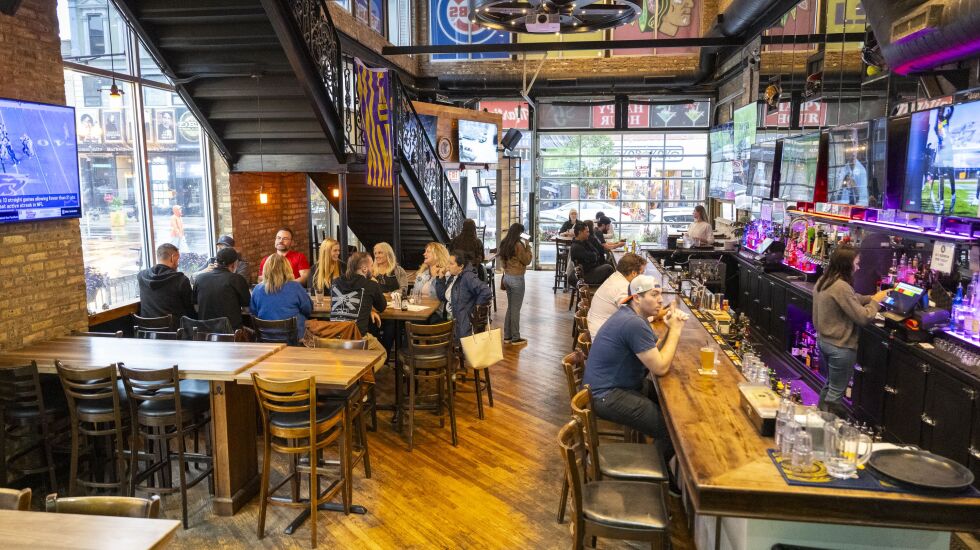
Ashonti Brown was the only server working at Margaritaville’s Navy Pier location during her Tuesday shift. On a good day, she brings home enough tips to make “more than the average person would working a 9-to-5.” When people don’t tip, the East Side resident tries to tell herself they just might not be able to afford it.
“But if you can’t afford it, don’t come out to eat, because at the end of the day, this is still how we pay our bills,” said Brown, 24.
Brown has been a server for four years. She said customers don’t always recognize that servers depend on tips to make at least minimum wage. The ordinance would help make up for the inconsistency in relying on tips.
“I used to serve at Hooters, and sometimes I had tables that just don’t tip at all,” Brown said. “Some people don’t tip when the bill be like $200, $300. Usually you’ll think they’d at least give you like $20-$30 because the bill is so high, but a lot of people don’t be having it.”
Brown works at one of the more than 7,300 restaurants in Chicago that would be affected by a proposal before the City Council to raise the minimum wage for tipped workers, who make 60% of Chicago’s minimum wage, to parity over the next five years. Some employees, like Brown, hope the increase will help, overall.
Some restaurant owners, however, worry about increased costs.
Here are some of their voices.
Aaron Bilgin, 50, owner of Standard Bar and Grill, 1332 N. Milwaukee Ave.
Bilgin said the proposed ordinance will hurt small restaurant owners.
“I want everybody to have a decent lifestyle, but the mayor’s move is completely wrong because he’s putting everything on small-business owners,” Bilgin said. “It’s very expensive to be a small-business owner these days because taxes are already high.”

While the move can be helpful for tipped workers, Bilgin said raising wages could make small-business owners to want to close their doors altogether.
“To be honest with you, my bartenders are already making more money than me,” Bilgin said.
Being forced to increase wages will just encourage owners to raise their prices, which could drive away customers, he said.
Josh Palafox, 23, server at Iron Age Korean Steakhouse, 1265 N. Milwaukee Ave.
Palafox had mixed emotions about how increased wages could affect him.
“Personally, it would help me because a lot of my money is just going to taxes,” Palafox said. “But there’s also a chance that restaurants lay off their servers, and I wouldn’t want the risk of losing my job because the owner can’t afford to pay me.”

Cynshae Mitchell, 23, a bartender at Margaritaville at Navy Pier
Mitchell said five years is too long of a timeline for something she believes should already have been done. Mitchell, who lives in Bronzeville, said she often has to serve and host in addition to her main job, which is tending bar.
“Sometimes I have three jobs in one,” Mitchell said. “It’s not always just peaches and ice cream and making drinks.”

She added that because how much she brings home is dependent on tips, which are optional, she has at times left work with as little as $20.
Concerned about inflation, Mitchell wants to make the full minimum wage sooner.
“We’re only getting $5 more. Minimum wage isn’t gonna feed my household,” Mitchell said. “It should be over at least a two to three year span, because it’s not going up $10, it’s not going up a drastic amount.”
Ruhi Maha, 22, server at Cumin, 1414 N. Milwaukee Ave.
Maha, who has worked for the restaurant nearly three years, said she worried about the restaurant’s ability to stay afloat if wages are raised.
“We’re small, and sometimes business isn’t that great,” Maha said.
“Yeah, it’d be nice to get paid more, but I wouldn’t want that if the owners couldn’t afford it,” Maha added. “If I give good service, then people leave tips.”
Tram, 32, server at Lao Sze Chuan, 520 N. Michigan Ave.
Like others, Tram, who wasn’t comfortable sharing her last name, didn’t approve of the five-year timeline, saying the change “should have been done five years ago.”
She said the restaurant she works at is often frequented by tourists who don’t tip as much. Tram, who lives in Logan Square, added that tips only make up enough to reach minimum wage about 60% of the time.
“We can’t really beg for money. But sometimes we make less because people don’t understand that we live off of gratuity,” she said. “Our clientele is mostly visitors from China who don’t have that in their culture of tipping.”
Nia Brown, 29, server at Pizzeria Uno, 29 E Ohio St.
Brown, who lives in Englewood, also supported the increased wage, but believes it should have been done sooner.
“The pay rate for servers is not fair with all the work that we do,” Brown said. “We do a lot of work in the food industry, and I don’t think we get as much credit as we should.”
She added that a recent raise at Pizzeria Uno just brought them up to about $7. This is her third job as a server, and she said it’s “hit or miss” if tips bring in enough to reach the full minimum wage.








